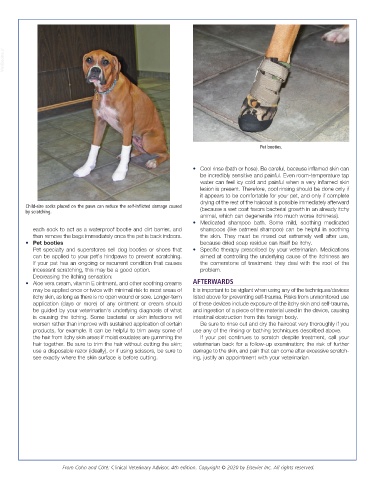Page 3200 - Cote clinical veterinary advisor dogs and cats 4th
P. 3200
VetBooks.ir
Pet booties.
• Cool rinse (bath or hose). Be careful, because inflamed skin can
be incredibly sensitive and painful. Even room-temperature tap
water can feel icy cold and painful when a very inflamed skin
lesion is present. Therefore, cool rinsing should be done only if
it appears to be comfortable for your pet, and only if complete
drying of the rest of the haircoat is possible immediately afterward
Child-size socks placed on the paws can reduce the self-inflicted damage caused (because a wet coat favors bacterial growth in an already itchy
by scratching.
animal, which can degenerate into much worse itchiness).
• Medicated shampoo bath. Some mild, soothing medicated
each sock to act as a waterproof bootie and dirt barrier, and shampoos (like oatmeal shampoo) can be helpful in soothing
then remove the bags immediately once the pet is back indoors. the skin. They must be rinsed out extremely well after use,
• Pet booties because dried soap residue can itself be itchy.
Pet specialty and superstores sell dog booties or shoes that • Specific therapy prescribed by your veterinarian. Medications
can be applied to your pet’s hindpaws to prevent scratching. aimed at controlling the underlying cause of the itchiness are
If your pet has an ongoing or recurrent condition that causes the cornerstone of treatment: they deal with the root of the
incessant scratching, this may be a good option. problem.
Decreasing the itching sensation:
• Aloe vera cream, vitamin E ointment, and other soothing creams AFTERWARDS
may be applied once or twice with minimal risk to most areas of It is important to be vigilant when using any of the techniques/devices
itchy skin, as long as there is no open wound or sore. Longer-term listed above for preventing self-trauma. Risks from unmonitored use
application (days or more) of any ointment or cream should of these devices include exposure of the itchy skin and self-trauma,
be guided by your veterinarian’s underlying diagnosis of what and ingestion of a piece of the material used in the device, causing
is causing the itching. Some bacterial or skin infections will intestinal obstruction from this foreign body.
worsen rather than improve with sustained application of certain Be sure to rinse out and dry the haircoat very thoroughly if you
products, for example. It can be helpful to trim away some of use any of the rinsing or bathing techniques described above.
the hair from itchy skin areas if moist exudates are gumming the If your pet continues to scratch despite treatment, call your
hair together. Be sure to trim the hair without cutting the skin; veterinarian back for a follow-up examination; the risk of further
use a disposable razor (ideally), or if using scissors, be sure to damage to the skin, and pain that can come after excessive scratch-
see exactly where the skin surface is before cutting. ing, justify an appointment with your veterinarian.
From Cohn and Côté: Clinical Veterinary Advisor, 4th edition. Copyright © 2020 by Elsevier Inc. All rights reserved.

